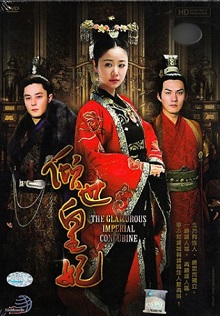
The Five Dynasties and Ten Kingdoms period was an era of political upheaval and division from 907 to 979. Five dynastic states quickly succeeded one another in the Central Plain, and more than a dozen concurrent dynastic states, collectively known as the Ten Kingdoms, were established elsewhere, mainly in South China. It was a prolonged period of multiple political divisions in Chinese imperial history.

Qiao Zong was a Han Chinese military leader in present-day Sichuan province in China during the Eastern Jin Dynasty. He proclaimed himself the Prince of Chengdu in 405 and was given the title "Prince of Shu" by Yao Xing, ruler of the Later Qin, in 409. His state is therefore sometimes known as Western Shu. His self-governing body coordinated offensive campaigns with Later Qin along the Yangtze River until Qiao's state was destroyed by a campaign under military subordinates of Liu Yu in 413.
The Book of Wei, also known by its Chinese name as the Wei Shu, is a classic Chinese historical text compiled by Wei Shou from 551 to 554, and is an important text describing the history of the Northern Wei and Eastern Wei from 386 to 550. Widely regarded as the official and authoritative source historical text for that period, it is one of the Twenty-Four Histories.
Meng Chang (孟昶) (919–965), originally Meng Renzan (孟仁贊), courtesy name Baoyuan (保元), formally Prince Gongxiao of Chu (楚恭孝王), was the second emperor of Later Shu during imperial China's Five Dynasties and Ten Kingdoms period. He ruled from 934 until 965, when his state was conquered by the Song Dynasty. He died soon afterwards.

Wang Ping, courtesy name Zijun, was a military general of the state of Shu Han in the Three Kingdoms period of China. Originally a military officer serving under the warlord Cao Cao in the late Eastern Han dynasty, in 218 he defected to Cao Cao's rival Liu Bei, who later became the founding emperor of Shu, during the Hanzhong Campaign. Though he was a talented orator, Wang Ping never learned to read because he joined the army at a young age. Yet he did not let this disadvantage stop him and had his clerk help him with his reports. Known for his self discipline, he steadily rose through the ranks to become a senior general. During his career, he defeated Zhang He, quelled Wei Yan's alleged rebellion and was the leading commander of the Shu forces during the Battle of Xingshi. The highest position he reached was Senior General Who Guards the North (鎮北大將軍).
Li Maozhen, born Song Wentong (宋文通), courtesy name Zhengchen (正臣), formally Prince Zhongjing of Qin (秦忠敬王), was the only ruler of the Chinese Five Dynasties and Ten Kingdoms period state Qi (901–924). He had become a powerful warlord during the reign of Emperor Zhaozong of Tang, the penultimate emperor of the preceding Tang Dynasty, with his power centered on his capital Fengxiang, and at times had effective control of Emperor Zhaozong. However, his power gradually waned due to defeats at the hands of fellow warlords Wang Jian and Zhu Quanzhong. After Zhu usurped the Tang throne and established Later Liang, Li Maozhen refused to submit and continued to use the Tang-bestowed title of Prince of Qi as well as maintain the Tang era name, but his territory became even more reduced due to wars with Former Shu and Later Liang. After Later Liang was conquered by Later Tang, whose Emperor Zhuangzong claimed to be a legitimate successor of Tang, Li Maozhen submitted as a subject and was created the Prince of Qin in 924. He died soon thereafter, and was succeeded as by his son Li Jiyan as the military governor (Jiedushi) of Fengxiang, but as Li Jiyan was not made the Prince of Qi or Qin at that point, this was typically viewed as the end of Qi as an independent state.
Hu Ji, courtesy name Weidu, was a military general of the state of Shu Han in the Three Kingdoms period of China.
Liu Xuan, courtesy name Wenheng, was a prince of the state of Shu Han during the Three Kingdoms period. He was the eldest son of Liu Shan, the second and last ruler of Shu. His mother was Consort Wang (王貴人), a former servant of Liu Shan's first wife Empress Jing'ai; Lady Wang later became one of Liu Shan's concubines. Liu Xuan became crown prince in c.February 238. After the fall of Shu to the rival state of Wei, Liu Xuan and his surviving brothers returned to the capital, Chengdu. In March 264, Liu Xuan was killed in Chengdu by rebelling soldiers during Zhong Hui's rebellion.

Romance of the Three Kingdoms is a Chinese television series adapted from the classical 14th century novel of the same title by Luo Guanzhong. The series was produced by China Central Television (CCTV) and was first aired on the network in 1994. It spanned a total of 84 episodes, each approximately 45 minutes long. One of the most expensive television series produced at the time, the project was completed over four years and involved over 400,000 cast and crew members, including divisions of the People's Liberation Army from the Beijing, Nanjing and Chengdu military regions. Some of the dialogues spoken by characters were adapted directly from the novel. Extensive battle scenes, such as the battles of Guandu, Red Cliffs and Xiaoting, were also live-acted.
Sun Ce's conquests in Jiangdong were a series of military campaigns by the warlord Sun Ce to conquer territories in the Jiangdong and Wu regions from 194 to 199 towards the end of the Eastern Han dynasty. The conquered lands served as a foundation for the state of Eastern Wu during the Three Kingdoms period (220–280).

Homaloxestis is a genus of moths in the family Lecithoceridae. The genus was erected by Edward Meyrick in 1910.

The Glamorous Imperial Concubine is a 2011 Chinese television series based on a novel of the same title by Murong Yin'er (慕容湮儿). Starring Ruby Lin with Kevin Yan and Wallace Huo, it was Lin's producing debut.
Liu Zhijun, courtesy name Xixian (希賢), nicknamed Liu Kaidao, was a general under Zhu Wen while Emperor Taizu was a major warlord during the late Tang Dynasty and then during Emperor Taizu's reign in his new Later Liang. Later, fearing that Emperor Taizu was going to act against him, he defected, first to Qi, then to Former Shu. Former Shu's emperor Wang Jian, however, also was apprehensive of his talent and later had him executed.
Wang Jingchong was an official and general of the Chinese Five Dynasties and Ten Kingdoms-period Later Tang, Later Jin, Later Han, and Later Shu states. During the reign of Later Han's second emperor Liu Chengyou, he, fearing defamation by the official Hou Yi (侯益), rebelled against Later Han in conjunction with Li Shouzhen (李守貞) and Zhao Siwan, and also submitted to Later Shu. After repeated defeats, however, he committed suicide.
Homaloxestis aciformis is a moth in the family Lecithoceridae. It was described by Shu-Rong Liu and Shu-Xia Wang in 2014. It is found in Chongqing, China.

Chinese Taipei competed at the 1994 Asian Games in Hiroshima, Japan. This was their 6th appearance in the Asian Games. They won at total of 7 gold, 13 silver, and 24 bronze medals, or 44 medals in total. They improved from the previous Asian Games in 1990, where they won a total of 31 medals. They won the most medals in Judo, where they got a total of 1 silver and 5 bronze.
The Galaxy Award is China's most prestigious science fiction award, which was started in 1986 by the magazines Tree of Wisdom and Science Literature & Art. After Tree of Wisdom ceased publication soon afterwards, the award was organized solely by Science Literature & Art, which was renamed to Science Fiction World in 1991.
Wang Lian, courtesy name Wenyi, was an official of the state of Shu Han in the Three Kingdoms period of China.






